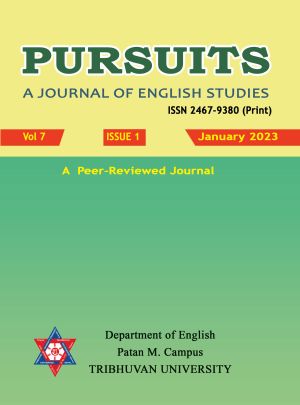The Posthuman Homo Faber in Atwood’s Oryx and Crake: An Ironic Portrayal
DOI:
https://doi.org/10.3126/pursuits.v7i1.55369Keywords:
Homo faber, human– excellence, apocalypse, posthuman-complexities, speculate, criticalityAbstract
As a dystopia, Margaret Atwood’s novel Oryx and Crake speculates the looming consequences of scientific inventions and technologies manifested in the destruction of natural equilibrium and posthuman complexities. Homo sapiens' unlimited desires and aspirations for enhancement and excellence have driven humans to enact the Creator. Crake, almost a mad scientist in the novel, creates the Crakers — genetically modified humans. To analyze this life force, the paper uses theoretical insights of humanists like Giannozzo Manetti, Rene Descartes and Friedrich Nietzsche regarding their celebration of human exceptionalism, reason, and free will. But, to counter-argue transgression in the pretext of progress, the paper also uses Donna Haraway’s concept of inter-speciesism and Rosi Braidotti’s critical posthumanism. They promote interdependence, critical review of the past and abstinence to address the posthuman crises and existential dilemmas. The enhanced Crakers are immune to starvation and ordinary diseases, devoid of art, imagination and creativity; but ironically feed on grass and their own excrement, and lack the essence of being human. They challenge Crake's genome project by transcending the lab-limitations but adapting to natural evolution. Hence, this paper examines Atwood's speculation of how modern science and technology distorts the symbiosis and disfigures the humans resulting in unwanted negotiations for survival. A post-human homofaber, Crake tries to resolve the existential crisis by eliminating the Bastion of humanity itself but ironically dehumanizes the human. The question is how far will humanity overrule nature? Who is accountable to repair the earth? Thus, this paper enables a thought exercise to retrospect on human insensibility and undergo abstinence of desires and luxury to save the future of this planet and lives from facing the impending apocalypse, as shown in the novel.




